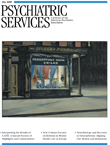Funds available from SAMHSA for treatment of homeless persons: The Substance Abuse and Mental Health Services Administration (SAMHSA) is accepting applications for fiscal year 2008 grants for its program titled Development of Comprehensive Drug/Alcohol and Mental Health Treatment Systems for Persons Who Are Homeless. The program's purpose is to expand and strengthen treatment services for persons who are homeless and who also have substance use disorders, mental disorders, or co-occurring substance use and mental disorders. SAMHSA expects that up to $10 million will be available for 25 grants of approximately $400,000 each for up to five years. About $4.5 million of total funds will be used to provide services in supportive housing. The grants will be administered by SAMHSA's Center for Substance Abuse Treatment. Domestic public and private nonprofit entities are eligible to apply. Applications must be received by May 29, 2008. The application form can be downloaded at www.samhsa.gov/grants/2008/ti_08_013.aspx.
SAMHSA and Ad Council target U.S. campuses with antistigma campaign: SAMHSA, working in collaboration with the Ad Council, has delivered its National Mental Health Anti-Stigma public service advertising (PSA) campaign for the first time directly to colleges and universities across the country. The campaign aims to reach young adults between the ages of 18 and 25 and is designed to decrease negative attitudes by encouraging young adults to support friends with mental health problems. Among all adults the prevalence of serious psychological distress is highest in this age group, but persons in this age group are the least likely to receive treatment or counseling. Young people are more likely to seek help if social acceptance is broadened and they receive support and services early on. The ads can be viewed at www. whatadifference.samhsa.gov. Also, in partnership with Alloy Media, the Ad Council and SAMHSA have delivered 450,000 campus packs, which included campaign brochures and additional materials for students, to bookstores at more than 200 colleges and universities. Bacchus Network, a nonprofit university- and community-based network that focuses on health and safety initiatives, distributed a mental health program manual and campaign PSAs and background materials to more than 1,100 on-campus peer educators. SAMHSA has also released a new dialogue report, Building Bridges: Mental Health on Campus, which is available by calling 800-789-2647.
AHRQ personalized pill card to support adherence: Step-by-step instructions for creating a pill card by using a personal or laptop computer and a printer are available on the Web site of the Agency for Healthcare Research and Quality (AHRQ). One in four Americans do not take prescription medicines as prescribed, and a significant factor in nonadherence is poor understanding of instructions about how to take medications. Research has shown that pill cards—which use pictures and simple phrases to show each medicine, its purpose, how much to take, and when to take it—reduce misunderstandings. The AHRQ site provides colorful clip-art images that include pill shapes and symbols for time of day and indications, such as a blood pressure cuff for blood pressure medications. Users cut and paste the images into a template, adding the names of medications, to create a personalized card. The instructions are available at www.ahrq.gov/qual/pillcard/pillcard.htm.
Information on properly disposing prescription drugs: In light of recent media reports about prescription drug residues in some water supply systems, SAMHSA is alerting consumers and clinicians to the useful information that it has developed for reducing this environmental risk by safely and effectively disposing of unused prescription drugs. SAMHSA has been providing this safety information through a pilot point-of-purchase program that it initiated in October 2007 and via its Web site at www.samhsa.gov/rxsafety. More than five million Americans have received this information. The material was developed by leading public health and environmental safety experts and offers the following basic recommendations. Consumers should always check patient information accompanying the product to see if it contains specific directions for disposing of unused medication and follow those directions. If no specific information is provided, then unused medication should be properly disposed of by mixing it with undesirable substances (such as old coffee grounds or used kitty litter), sealing the mixture in a container, and placing it in the trash. Unused medication may also be donated to authorized community prescription drug take-back programs.
NIAAA video training program for clinicians: A video training program from the National Institute on Alcohol Abuse and Alcoholism (NIAAA) provides clinicians with evidence-based strategies for screening, assessing, and treating patients. The online program features four ten-minute video case scenarios, each led by an expert clinician in a different treatment setting. The program also includes a tutorial that teaches clinicians how to ask patients about alcohol use, assess heavy drinkers for alcohol use disorders, and help them cut back or quit. The case studies and tutorial require about an hour to complete. They are available on the NIAAA Web site at www.niaaa.nih.gov/guide.

